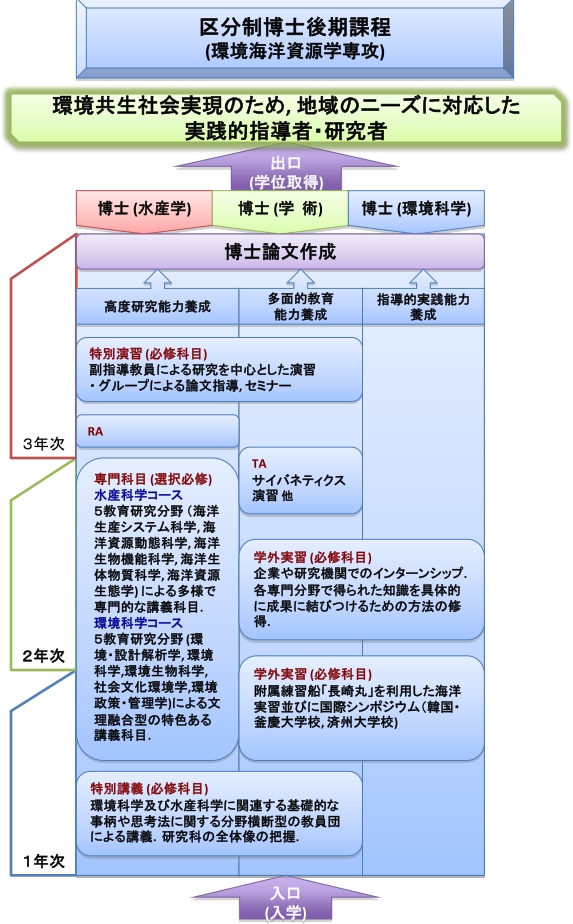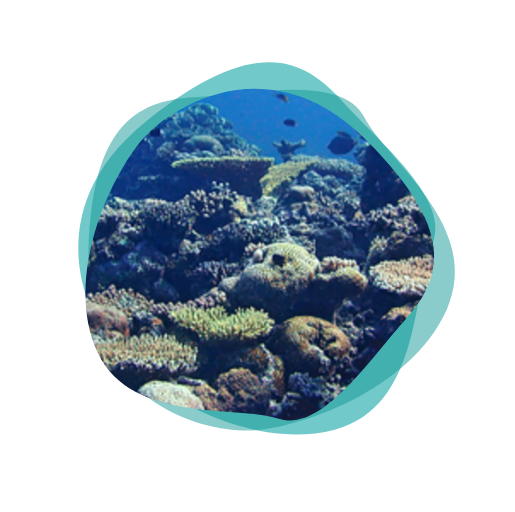Doctoral course: Department of Environment and Marine Resources
Purposes of human resource development and purpose of education and research
As the 21st century is said to be the century of food and the environment, there is an international demand for harmonization of nature and environmental conservation with production and development, and the sustainability of food production and the environment is considered fundamental. In order to meet these social demands, the Graduate School of Fisheries and Environmental Sciences aims to "promote education and research in the interdisciplinary and comprehensive fields of fisheries science, environmental science, and the fusion of the two, in order to develop highly-skilled professionals with practical leadership skills and internationally-minded researchers who can contribute to solving problems related to the environment and food. The basic philosophy of the university is to "contribute to the creation and development of new interdisciplinary science for the realization of human existence in harmony with the environment. Both fisheries science and environmental science, whose academic missions are to supply fisheries food and conserve the environment, are oriented toward coexistence and symbiosis between humans and nature. In addition to education in each specialized field, the Graduate School aims to strengthen cross-disciplinary education to make interdisciplinary fusion a reality and to develop human resources who can respond to the needs of society as described above.Admission Policy
1. Educational philosophy and objectives
As the 21st century is said to be the century of food and the environment, there is an international need to harmonize nature and environmental conservation with production and development, and society, business, and government are all focusing on the sustainability of food production and the environment. In order to respond to these social demands, the Graduate School of Fisheries and Environmental Sciences (GSES) aims to "promote education and research in the interdisciplinary and comprehensive fields of fisheries science, environmental science, and the fusion of the two, and to develop highly qualified professionals with practical leadership skills and internationally-minded researchers who can contribute to solving problems related to the environment and food. The basic philosophy of the university is to "contribute to the creation and development of new interdisciplinary science for the realization of human existence in harmony with the environment. The Department of Fisheries Science and the Department of Environmental Science, whose academic mission is to supply fisheries food and conserve the environment, are both oriented toward the coexistence and symbiosis of humans and nature, and have much in common in terms of the problems they target and the methods they use to solve them.The Department of Environmental and Marine Resources in the Doctoral Program of the Graduate School of Science and Technology fosters practical researchers in the interdisciplinary fields of fisheries science, environmental science, and the fusion of the two, who can contribute to the resolution of regional issues and have an excellent ability to respond to international society. There are two courses in this department as follows. In the Fisheries Science Course, students acquire new knowledge and techniques for the safe and advanced use and proper management of marine food resources.
2. Students required
The department is looking for people who are interested in and enthusiastic about acquiring the above-mentioned specialized knowledge and skills, and who have basic and specialized knowledge and academic skills at the level of a master's degree in the sciences related to each course, both in Japan and overseas.3. Basic policy for selecting students
From the viewpoint of seeking a wide range of students, we have established the following selection methods: General Entrance Examination, Entrance Examination for Working Adults, Entrance Examination for International Students, and Selection for Students Preparing for University Entrance. In addition, when applying, please have an interview with your primary supervisor in advance.4. Selection method
The following four entrance examinations are available for students who meet the qualifications specified by the Graduate School (see the application guideline for details).General Admission
Evaluation will be based on document review, written examinations (specialized subjects and English), and interviews (including oral examinations)
Entrance Examination for Working Adults
Applicants who have been working at the same company as a regular employee for two years or more at the time of admission and have been approved by the head of the company are required to have an interview (including an oral examination).
Entrance Examination for Foreign Students
An interview (including an oral examination) will be conducted.
Those who do not have Japanese nationality are eligible to apply.
However, those who have graduated from a Japanese university and have completed or will complete a graduate course in Japan are excluded.
Selection of students for further study
Applicants who plan to complete their Master's or Master's course at Nagasaki University are required to take a written examination (specialized subjects and English) or an interview (including an oral examination).
Curriculum Policy
Fisheries ScienceIn order to train practical leaders and researchers who can provide new knowledge and technology for the safe and advanced use and proper management of marine food resources, students acquire advanced knowledge in a wide variety of academic fields, including marine environment and resources, fishery production, biological functions, material science, and food science. As common subjects for the two educational courses, we have introduced special cross-disciplinary lectures by multiple faculty members, practical training at related facilities that emphasize practical experience, and onboard training on the ocean. In addition, students will be exposed to various problems in the region and in the field through the lecture courses of the cooperating courses, which are composed of researchers from other research institutions, in order to enhance their practical research skills. In the course, education and research fields of marine production system science, marine resource dynamics science, marine biological function science, marine biomaterials science, and marine resource ecology are established, and diverse and specialized lecture courses are offered so that students can acquire distinctive and advanced theories and research methods in specialized fields. Students are required to take elective courses in a wide range of fields, including marine environment and resources, fishery production, biological functions, materials science, and food science. In addition, "Special Lectures" and "Special Exercises" are offered to cultivate problem-solving and creative research skills from a wide range of perspectives, and "Off-Campus Practical Training" is offered to broaden students' perspectives in specialized fields.
Environmental Science
We promote research and education in environmental science that aims for harmonious coexistence and symbiosis between human beings and nature through a comprehensive, interdisciplinary approach that transcends the fragmentation of conventional academic fields. The course also provides students with the broad knowledge and high level of expertise necessary for practical leaders and researchers who can solve environmental problems and contribute to the construction of an environmentally symbiotic and sustainable society. To this end, the course has established the following education and research fields: environmental design and analysis, environmental chemistry, environmental bioscience, sociocultural and environmental studies, and environmental policy and management. In addition, we also offer elective courses that integrate the humanities and sciences, such as environmental symbiosis policy, resource recycling, and environmental conservation technology. In addition, "Special Lectures" and "Special Exercises" are offered to cultivate problem-solving and creative research skills from a wide range of perspectives, and "Off-Campus Practical Training" is offered to broaden students' perspectives in specialized fields.

Diploma Policy
Based on the specialized knowledge base in each field acquired in the three majors of the Master's Course (Fisheries Science, Environmental Symbiosis Policy, and Environmental Conservation Design), students will acquire a higher level of specialization and comprehensiveness to train practical leaders and researchers who are also capable of responding to international society. Fisheries Science Course Students will be equipped with new knowledge and skills in fisheries science for the safe and advanced use and proper management of marine food resources, and will be trained to be practical leaders and researchers with the ability to solve comprehensive problems that meet the needs of local communities and the international community. Environmental Science Course This course fosters practical leaders and researchers who have acquired a high level of expertise in environmental science and the ability to respond to the international community, based on a broad knowledge base to solve environmental problems and contribute to the construction of a sustainable society that is symbiotic with the environment.Thesis Examination Criteria
A doctoral dissertation must contain content related to fisheries science, environmental science, or an interdisciplinary and comprehensive field that integrates the two, must contain high academic value such as originality, novelty, universality, and argumentation, and must be a highly complete dissertation that is logically organized as an academic paper. In addition, applicants for the dissertation review must meet the following criteria by the time the dissertation review is completed.1) The applicant must be able to acquire credits for the courses required for completion of the doctoral course.
2) As stipulated in the Graduate School's Diploma Policy, the applicant must have the ability to independently conduct research activities as a practical leader and researcher who has acquired a higher level of expertise and comprehensiveness, and who is highly responsive to international society, based on the specialized knowledge base in each field acquired. The applicant must have objective data (published papers) to show that he or she has the ability to conduct independent research activities as a practical leader and researcher who has acquired a higher level of expertise and synthesis and who is also highly responsive to international society, and that he or she has the academic knowledge to provide the basis for this.
3) Objective materials (published papers) in 2) must meet the following requirements.
① Published papers included in the content of a dissertation for the purpose of course completion must include one paper whose main content has been published (or accepted for publication) in an academic journal with an established review system, and at least one more paper that has been published or is expected to be published.
② In principle, the above published papers should be published during the period of enrollment in the doctoral course.
presented in an open format, and must be recognized as suitable for the doctoral degree by the Degree Examination Committee, the Doctoral Program and Doctoral Course Committee, and the Graduate School Faculty Committee.
For details, refer to the Degree Examination Regulations.

